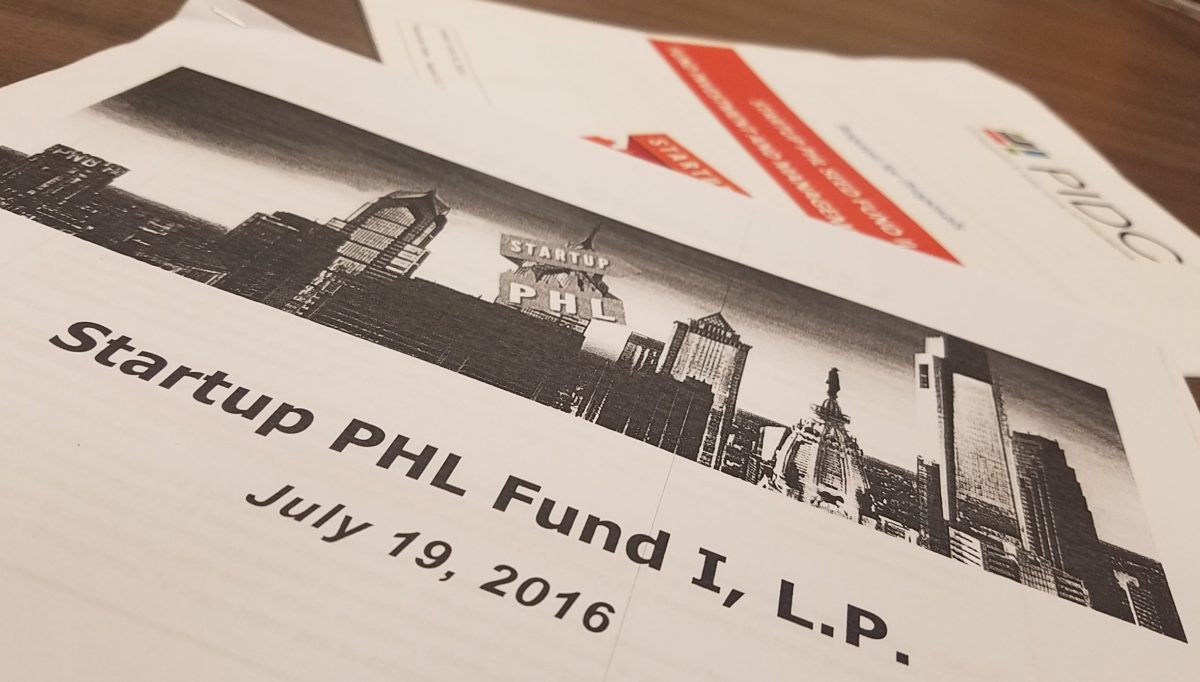After a three-year run under First Round Capital, StartUp PHL — the city initiative to directly invest in Philadelphia’s startup ecosystem — is shutting down its existing venture fund. City officials are now searching for a new fund manager as they work to establish the StartUp PHL Seed Fund II.
Though the University City-based venture capital firm will continue to oversee the investments of the first fund, First Round Capital says it will not be submitting a proposal for the RFP announced today.
“It’s a good opportunity for another firm to provide a fresh perspective,” First Round managing partner Josh Kopelman said in an exclusive interview with Technical.ly. “Change is good to continue to deploy capital.”
Through the program — a marquee initiative of former Mayor Michael Nutter — investments made by the quasi-governmental Philadelphia Industrial Development Corporation (PIDC) into Philly-based startups were matched by First Round Capital.
“StartupPHL was designed to accelerate the development of a supportive environment for local entrepreneurs,” Mayor Jim Kenney said in a statement Wednesday. “The City is proud of the success this initiative has achieved to date and committed to its goal to continue to establish Philadelphia as a city of choice for new startups and entrepreneurs.”
In a meeting with Technical.ly on Tuesday, city, PIDC and First Round officials presented the most comprehensive accounting of StartUp PHL’s investment activity to date.
All told, StartUp PHL Fund I invested in 10 companies, with investments of $1.1 million each from PIDC and First Round Capital. First Round Capital also made follow-on investments of $3.8 million. As an angel investor, Kopelman personally invested $175,000 in StartUp PHL portfolio companies. The companies themselves have raised a total of $36.3 million, in both angel and seed capital, according to StartUp PHL officials. The 10 companies employ over 100 workers.
While retaining local startups was a stated goal of the program, ironically only six of the companies from StartUp PHL’s original roster remain active and in Philadelphia:
Three StartUp PHL companies moved elsewhere:
- Netsil (formerly Gencore Systems) moved to San Francisco
- Tesorio also left for Silicon Valley and now resides in Burlingame, Calif.
- CloudTalk (better known as Nucleus) is now based in New York City (though its founder remains in the Philly area)
And then there’s StartUp PHL’s first investment, Real Food Works, which permanently shut down last month citing low profit margins and rising shipping costs.
As the fund closes, a previously undisclosed fact about Real Food Works has now been made available: In February 2015, “Real Food Works exchanged preferred stock of the company to obtain common shares of Monetate, Inc.,” according to a StartUp PHL document.
“One thing we had not announced previously is that when Monetate brought on board [Real Food Works founder] Lucinda Duncalfe it was structured as an acquihire,” Kopelman said. “StartUp PHL ceased to be a shareholder in RFW and became a shareholder in Monetate.”
That means StartUp PHL has a stake in the Conshohocken-based ecommerce optimization company.
“Even though Real Food Works has shut down, we still expect a positive return on the investment,” said Kopelman.
“From our perspective, the summary [from Fund I] showed overall a very positive outcome,” PIDC President and CEO John Grady told Technical.ly. “It has encouraged us to stay at this, to take the remainder of the capital and roll it into a second fund.”
“We’re happy with the portfolio we’ve put together,” Kopelman echoed. “I’m surprised that we haven’t seen a higher mortality rate. I’ve been very impressed by [PIDC’s] willingness to embrace these kinds of odds.”
Kopelman, who in 2013 toasted with a kale smoothie to the success of StartUp PHL’s initial investment, now reflects positively on the fund’s performance.
“StartUp PHL was an experiment which mostly worked,” said Kopelman. “Early indicators are looking promising, and we think it’s generated visibility of the local environment.”
Both PIDC and First Round Capital agreed on some general lessons from the project:
- More activity is necessary early in the funding cycle. That’s part of the reason why the Angel Fund component was added in the second year of the fund.
- Failure is to be expected. And likely to come, given the average 50 percent failure rate in seed-stage investments.
- Companies moving from Philly is a possibility. Retaining investments in companies that leave allows for further investment in the local scene.
Getting used to companies failing, as they naturally do in the startup environment, is a healthy lesson of the first fund’s closing. Particularly promising is this quote from PIDC’s Grady:
“We know some more of these will fail, we know some of these will be successful,” he said. “We don’t know which, otherwise we’d play Powerball or something.”
As the request for proposals is released (applications are due by Aug. 31) and StartUp PHL kicks off the search for a new partner, the question of transparency also remains. Should startups in this initiative be held to a higher standard? Should they be encouraged to disclose lessons learned? Grady thinks not.
“From where I sit at PIDC, I don’t think they’re held to a higher standard,” he said.
“I actually think that’s an adverse signal,” Kopelman chimed in. “We want entrepreneurs to want to take this capital, and that would add hurdles to the process.”







